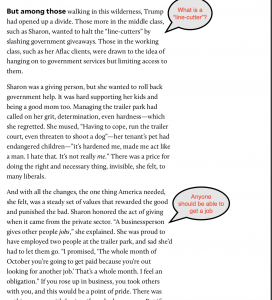
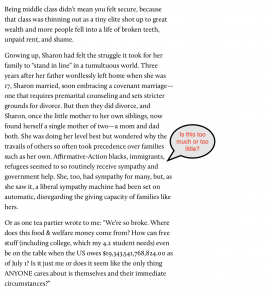
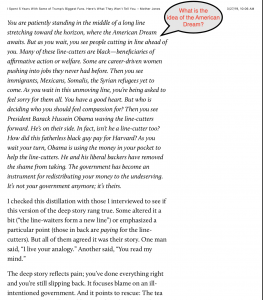
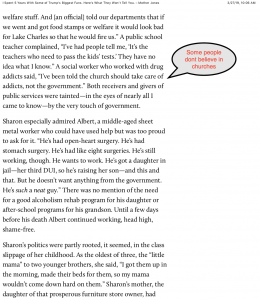
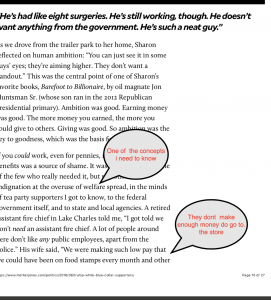
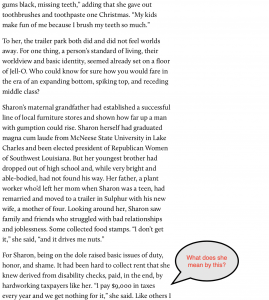
These are the annotations from writing lab. I will add the ones I did for homework today.

Just another UNEPortfolios site






These are the annotations from writing lab. I will add the ones I did for homework today.
Bullet 1:
People are hidden behind theories that shape the U.S. However, behind those theories are people’s deep story. Everyone has a story behind who they are and what the believe in. Sharon describes the deep story as “reflects pain; you’ve done everything right and you’re slipping back.”(Page 14) From my understanding of a deep story, a deep story is something that people hide to protect them. They use this as a way to cover their rights and for personal protectionism.
Bullet 2:
No matter your race or social-class people judge everyone. However, people of the higher-class tend to get more judgments towards them. People who have money are stereotyped.
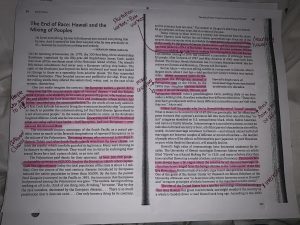
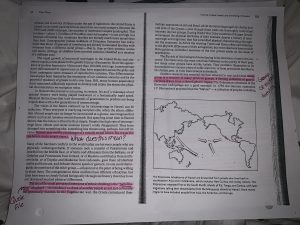
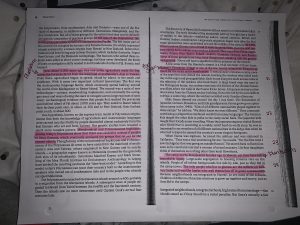
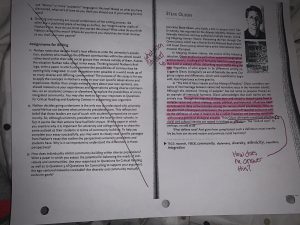
The article explains how the United States has a smaller amount of mixed marriages than Hawaii does. Since people began settling in Hawaii, the “high rate of intermarriage here, ethnic and racial tensions haven’t really disappeared.”(Page 252). However, they have changed. My understanding of this is that people who are with different ancestors move to Hawaii and begin their life there. As they get married and have a family, they create more inter-racial families.
Research has shown that a collection of genetic form has been drawn from shared genetic legacy.
**I had a hard time answering these questions**
Alivia Shattuck
March 1, 2019
Eng 123
As your sitting in a classroom full of people you many or many not know everyone, but each person has their own life story and identity. From their race and gender to their social class and work ethics, we are all put into a category. In the past and even now today the way that black people live are very different. The way you get treated, raised or even the footsteps they have to follow vary by race. In order to understand the way that our lives and life paths are shaped by our social identities, let’s look at Te-Nehisi Coates and Mike Rose, both grew up in a neighborhood where they had to worry about their race as they walked down the street every day and fought to find themselves a future. Although Coates was black and grew up in Baltimore in the 1980s and Rose was white growing up in Los Angeles in the 1950s, they both had their lives changed by their social identities. Coates grew up hearing stories from his family about the challenge he has to face because he is black. However, Rose, had to face similar challenges due to him being white and living in a neighborhood of Hispanics and African Americans. For Coates, he had a fear of walking down the street because he was black. These causes him to feel vulnerable as his social identity has changed the way he lives his life. He lives his life in constant fear and always be on the lookout for safety. When for Rose, he was afraid because he was white. Roses life is shaped by his neighborhood and who stood around him. Coates helps us to explain how he felt as a black person living in the 1980s by stating “As for now, it must be said that the process of washing the disparate tribes white, was not achieved through wine tastings and ice cream socials, but rather through the pillaging of life, liberty, labor and land; through the flaying of backs; the chaining of limbs; the strangling of dissidents; the destruction of families; the rape of mothers; the sale of children; and various other acts meant, first and foremost, to deny you and the right to secure and govern our own bodies”(Page 8) For Coates, growing up as an African American has shaped how he thought of his social identity. He became angry at the fact that people who are black have to be shaped because of their identity.
As Coates grows up living in Baltimore, he came to an understanding of how Americans are shaped based on their identity. He adds “Americans believe in the reality of “race” as a defined, indubitable feature of the natural world.” (page 7). He believes that race is something that naturally taught to be different. The way black people are treated is a way to destroy their body and who they really are. They are taught that they are less than those who are white. Coastes growing up in a black family was exposed to violence and comments. This shaped who he as. As he dedicated his story “Between the World and Me” to his son, he explains that because you are black their will changes as you go throughout your like. Living in America and hearing about the American dream, he comes to his own understanding of the American Dream. The American Dream to him is that people who are black are taught that it is natural to have racist comments towards them and that because of this their bodies where to be destroyed. The American Dream is based on enslavement and our schools are there to fail us and the destruction of the population. Coates explains how “When our elders presented school to us, they did not present it as a place of high learning but as a means of escape from death and penal warehousing. Fully 60 percent of all young black men who drop out of high school will go to jail. This should disgrace the country.” (Page 27). For Coates, he faced fear and violence within the ways school affected him. Schools affect those who were black, and they shaped their life path. Because those who were black did not feel comfortable in school, they convinced them that there was no future ahead of them because of their race.
Even though Mike Rose was white, his social identities shaped his life paths and his life. Rose’s experience was similar but different as he grew up. Rose grew up in a working-class family on Vermont Ave in Los Angeles. He lived in fear as he left his front door. He found a passion for chemistry. In his senior year of high school, he met a role model who helps shape who he was as a person. Jack McFarland was a role model to him on being able to succeed in life. McFarland was able to let Rose see that there is a world outside of Vermont Ave. He explains this by saying “It enabled me to do things in the world. I could browse Bohemian bookstores and Farah call my mysterious Hollywood I could go to the cinema and see if vents through the lens of European directors and most of all I could share an evening talk that talk with Jack McFarland the man I most admired at the time. Knowledge was becoming a bonding agent. Within a year to the Persona of the disaffected Hipster would prove too cynical to alienate to last. Before our time it was new and exciting it provided a critical perspective on society and it allowed me to act as though I were living beyond the limiting boundaries of South Vermont.” (Page 37). Rose believed that after he met McFarland, he could do anything. He was able to override his social identity and persuade what he wants to as he lives his life paths. As Rose had McFarland as a role model, he was able to see that this world has in hold for him.
Rose and Coates both were shaped by their social identities and how they were treated. In Coates story, he was able to teach his son the information he needs to live in a world where blacks are mistreated. He talks about America as if the things they did harm his body in a way he was unable to succeed. For Rose, he was taught that no matter your upbringing with the help of a persuasive adult you can do what you need to succeed.
03-01-201
As a teacher, Jack MacFarland has become a role model for Mike Rose. MacFarland teaches Rose that those dreams you have in your head can become a reality if you really believe in it. He gives him this idea that if you block out your surrounds and believe in what you wanna do those dreams can happen. As Rose’s comes from a working-class family the dreams of going to college was down the drain for him. But as he says to MacFarland “When I finally said, ‘I don’t know”, Macfarland looked down at me- I was seated in his office-and-said,’listen, you can write.'” This helped Rose broaden his horizon that there is a future out there for him. Just because the people around you might be of the working-class with no higher education does not mean that you can make a difference and go to college and earn a degree. MacFarland teaches Rose he can help to open those doors to the upper-middle-class. That does not necessarily mean what money or job you have. It means something bigger. The upper-middle-class is a place where he is not living on Vermont Ave. a place where his dreams cannot be a reality. He wants to get out in the world and be productive and he gets this motivation form, MacFarland, because before he came into Rose’s life dreams were not realities they were thought in his head. By the end of the story, Rose comes to a realization of what the. future has for him by stating “Within a year or two, the persona of the disaffected hipster would prove too cynical, too alienated to last. But for a time it was new and exciting; It provided a critical perspective on society, and it allowed me to act as though I were living beyond the limiting boundaries of South Vermont.”. He says this because before he had MacFarland as a teacher he could only think of this. future within the walls of his street. Now that he has an understanding of the outside world he believes that he can do anything and does not have to follow the footsteps of his family members.
02-28-2019
As Mike Rose’s time in Voc. Ed. he learned that people surrounding them are all different in many ways. Attending this school has surrounded him with many different people backgrounds and I believe that helped shaped who he is. He came to the understanding that surrounding yourself with people who. are unlike you in one way to identify who you are. As Rose was attending Voc. Ed. he became close with Ken Harvey. In class one day Harvey said, “I just wanna be average”. My understanding of Rose’s answering to Harvey’s statement is that people but into their mind what “average” is. Rose’s definition of average is different than Harvey’s as he states “who wants to be average?”(Page 28) As you sit in a classroom or in the matter of fact anywhere, the person next to you definition of average is different than yours. As Rose becomes close to Harvey, he obtains his reflection on his identity and coverings. Harvey may be a person who inside he does not like his identity and tries to cover it. He makes the statement “I just wanna be average” because he looks at how other people may grow up and who they are and he wants to be just like them. My understanding of this that people look around and see how other people are and form an opinion of average. They then feel as if they are less than those people and they begin to try and cover who they really are. Ta-Nehisi Coates is an African American who would view this situation in a different view. If Rose were viewed Harvey’s statement as if Harvey was black Rose’s answer would not be the same. Rose would think that Harvey wanted to be white because he wanted to be average and those who were black were mistreated and wanted to be the other race.